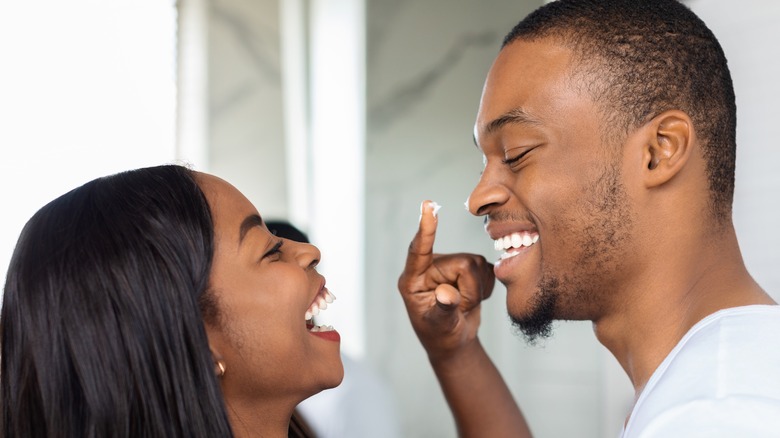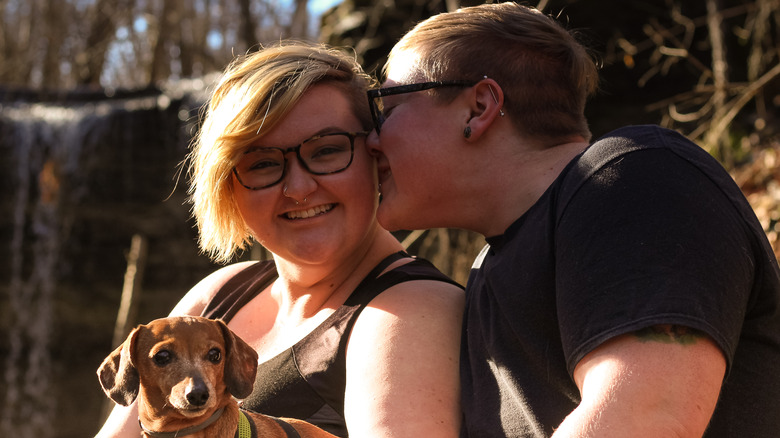Why Play Is A Crucial Ingredient For Happiness In A Relationship
Although play is something we engaged in as children, somewhere along the way (and especially in our romantic connections), work seems to have replaced this fun-loving trait. Relationships take work, but what if play was at the center of it all? What if — instead of making relationships only about putting in the work and reaping rewards later — we focused on bringing some fun into the equation?
Think about the witty and often hysterical dialogue between the mother-daughter duo, Lorelai and Rory Gilmore, in the much-loved comedy-drama television series, "Gilmore Girls" (2000). It's hard to not get drawn into their unique world of inside jokes, funny commentary, and playful banter with each other. Do you also notice how, often inexplicably, we are drawn to easy-going, playful people in social settings? Either they're cracking jokes and making people laugh or making you feel comfortable in your own skin by inviting you to join in the silliness.
Perhaps this is why various researchers have looked into the benefits of playfulness in romantic unions as well. It is one of the signs that your relationship can last a lifetime. What does it mean, however, to be playful with your partner?
Play is about letting your guard down
A 2016 study published in Psychiatry looked into intimate play and marital adaptation. "Playing is a reconnoitering of the unknown borders of two psyches, whose contours can become reassuringly familiar only through the experience of mutual vulnerability and nonjudgmental responsiveness," concluded lead author R. William Betcher. "It is through playing that we learn how to approach someone's more intimate self."
Do you or your partner enjoy goofing around in public when no one's watching? Do you each have nicknames for the other? Do you have a way of teasing one another during a serious conversation just so you can lighten the mood? If you do, then you might be on the right track when it comes to playfulness. Sociology professor at the University of South Carolina-Beaufort Deborah J. Cohan notes in Psychology Today that relationships with play often feel lighter and more freeing. You and your partner may foster affection and admiration for one another, as opposed to disdain and frustration.
The goal is not to shun the serious stuff or live in a bubble of denial about your relationship problems — it is about approaching your union with a sense of light-heartedness and love. Psychologist Rene Proyer found that being playful with your partner can help in areas of communication and add to your happiness (via Psychology Today). It is crucial for relationship longevity, too.
How to add play to your relationship
From being flirty to jokingly re-enacting your partner's incessant snoring at night, there are a number of ways in which you can add play to your relationship. According to relationship expert Rachel Sussman, however, taking it too far can be a problem (via Insider). Things like public humiliation in a relationship should not be tolerated. "Some people's humor is cutting and that's not really humor," Sussman told the publication. "There's something else going on there — an aggressiveness, or even a depression."
You may want to start by understanding your partner's sense of humor. If you tease them out of the blue (especially if you haven't done so in the past), it may come as an unwelcome surprise to them. Discussing the need for some mischievousness in your union is not a bad idea, either — particularly if you've both been burdened with life's responsibilities lately. If you aren't naturally inclined to be playful, Sussman noted to Insider that watching a funny movie together could get things moving.
Developing inside jokes and remembering to laugh when things get too serious are some simple ways to inject play into your relationship. Taking on a new, fun hobby to engage in together could help, too. Your happiness will depend on how curious you are in regard to learning about one another. Play will look different for every couple, but what's crucial is that you let your inner child out as often as possible.


